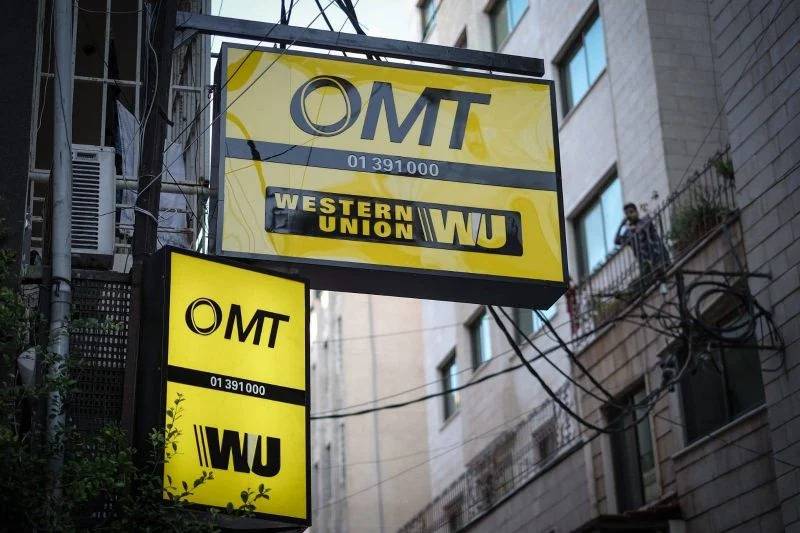
An OMT money exchange office in Beirut. (Credit: João Sousa/L'Orient Today)
Want to get the Morning Brief by email? Click here to sign up.
Banque du Liban governor Riad Salameh confirmed the official adoption as of today of the LL15,000 lira-to-dollar exchange rate, a tenfold increase on the previous, longstanding official rate. The Finance Ministry initially announced the increase in November and the new rate was adopted to calculate several items in the 2022 budget. The increase is intended as a step towards unifying exchange rates, one of the reforms prerequisite to unlocking a multi-billion International Monetary Fund aid package. The new exchange rate is still significantly less than the central bank Sayrafa rate, at LL38,000, and the parallel market rate, around LL58,000. Salameh said that commercial banks “will see a decrease in their assets in lira once converted to dollars,” which they will have five years to reconstitute. Also today, an update to circulars No. 151 and No. 158 announced earlier this month will come into effect, allowing depositors to use the new official exchange rate to make limited withdrawals from their US-dollar denominated deposits — frozen in commercial banks by informal capital controls since the onset of the economic crisis in 2019. The LL15,000 rate has already been in effect for the “customs dollar” (the rate used to calculate lira customs duties on dollar-priced imports) since Dec. 1.
Caretaker Prime Minister Najib Mikati said he would call for a government meeting by “early next week at the latest” addressing issues that have an “urgent priority and cannot be decided outside the cabinet,” notably in the education sector. “I cannot afford to meet the demands of public school teachers without doing the same for their colleagues at the Lebanese University,” Mikati said, adding that a date will be set once he receives necessary information from the rector of Lebanon’s sole public university. Mikati had announced a session to address issues in the education sector would be scheduled for this week; however, his press office later said no meeting would be held. Public school teachers have been on strike since Jan. 10 to demand amended compensation, health coverage and contracts. The presidential vacuum in effect has led to controversy regarding the cabinet’s ability to meet and issue decisions due to its caretaker status.
Lebanese Army chief Gen. Joseph Aoun is the frontrunner among three compromise candidates proposed to Hezbollah more than a week ago by the Progressive Socialist Party, PSP MP for Aley Ragy El Saad said yesterday. Aoun is a favorite “not only for the PSP but for other parliamentary groups and foreign countries as well,” Saad added, explaining that an amendment to the constitution would be necessary to elect the army general — military personnel cannot be presidential candidates unless they are retired or their resignation has been accepted six months before the election. The same day, PSP head Walid Joumblatt said after a sit-down with Parliament Speaker Nabih Berri that during their meeting the pair endeavored to “break political barriers” in order to elect a president. Saad claimed no president could be elected if “Amal-Hezbollah and [allied] Gebran Bassil do not make a decision.” Last Sunday, Bassil said he would consider running for president if no agreement on another candidate is reached, while in the same speech, he criticized Joseph Aoun and expressed concerns over the alliance tying his party, the Free Patriotic Movement, to Hezbollah. Parliament has held 11 failed presidential election sessions since the start of the election period two months before the end of Michel Aoun’s term on Oct. 31.
“Lebanese and refugees are struggling to protect their families from the cold weather,” the United Nations Refugee Agency (UNHCR) said yesterday, as falling temperatures, rain and snowfall blocked roads and prompted warnings from caretaker Public Works Minister Ali Hamieh. The Public Works Ministry called on motorists to avoid mountainous areas after a number of trucks were blocked on the Dahr al-Baidar road on Monday. Heavy rainfall flooded several roads on Tuesday morning, including in Hazmieh, just south of Beirut, as well as in Nabatieh and Saida in South Lebanon. Meanwhile, the Ainata-al-Arz, Chouf-Kefraya, Kfardebian-Hadath-Baalbeck, Akoura-Hadath-Baalbeck, Hermel-Dennieh and Hermel-Yammouneh roads were completely blocked by snow, the Road Traffic Management Center said. The shift in weather follows unusually high temperatures this winter which had delayed the start of the ski season in Lebanon, on which over half Kfardebian’s inhabitants rely according to Josephine Zgheib, director of the tourism committee in the Kfardebian municipality.
The Internal Security Forces announced the arrest of a woman who allegedly attempted to smuggle stolen funds out of Lebanon. The ISF claimed to have stopped a woman at the Beirut international airport on her way to Ethiopia with around $100,000 she had allegedly siphoned during four years of employment for a Lebanese family. Rights group Egna Legna founder Banchi Nimer said that false accusations by sponsors against migrant workers have become “common phenomena” due to which “hundreds of migrant workers get stuck [in Lebanon].” The kafala system leaves foreign domestic workers vulnerable to abuses — such as being deprived of the right to sue their employers in cases of mistreatment and defaulting on salary payments.
In case you missed it, here’s our must-read piece from yesterday: “Rolling to a halt: The reasons behind the discontinued operation of French buses in Beirut”
Compiled by Abbas Mahfouz